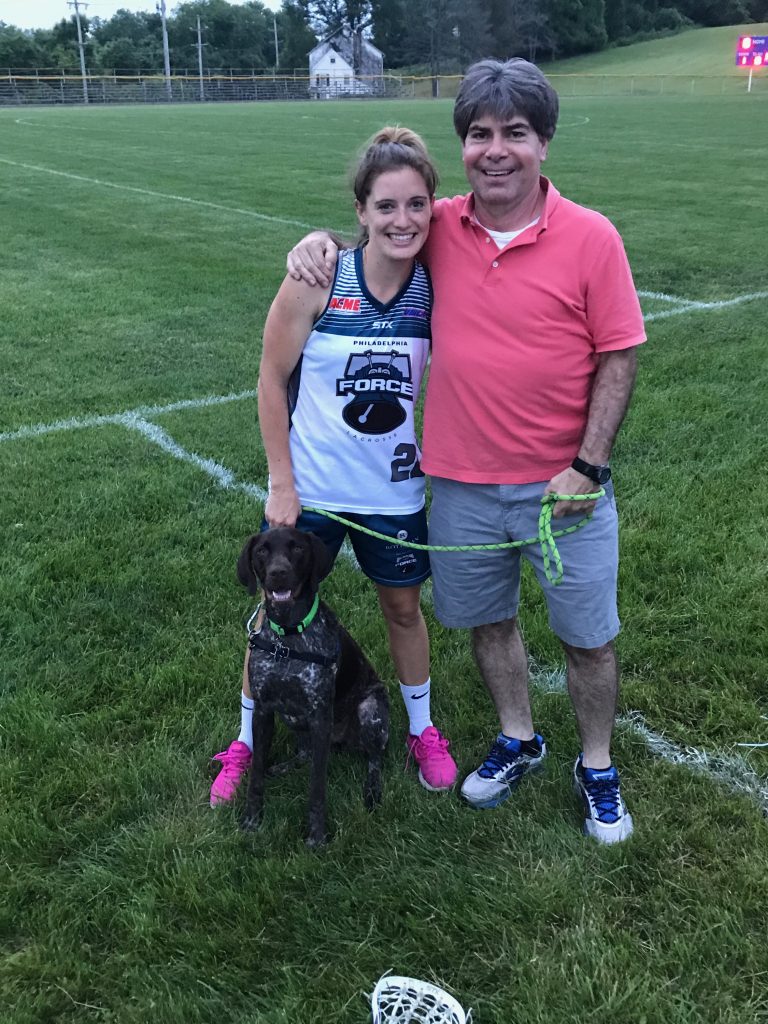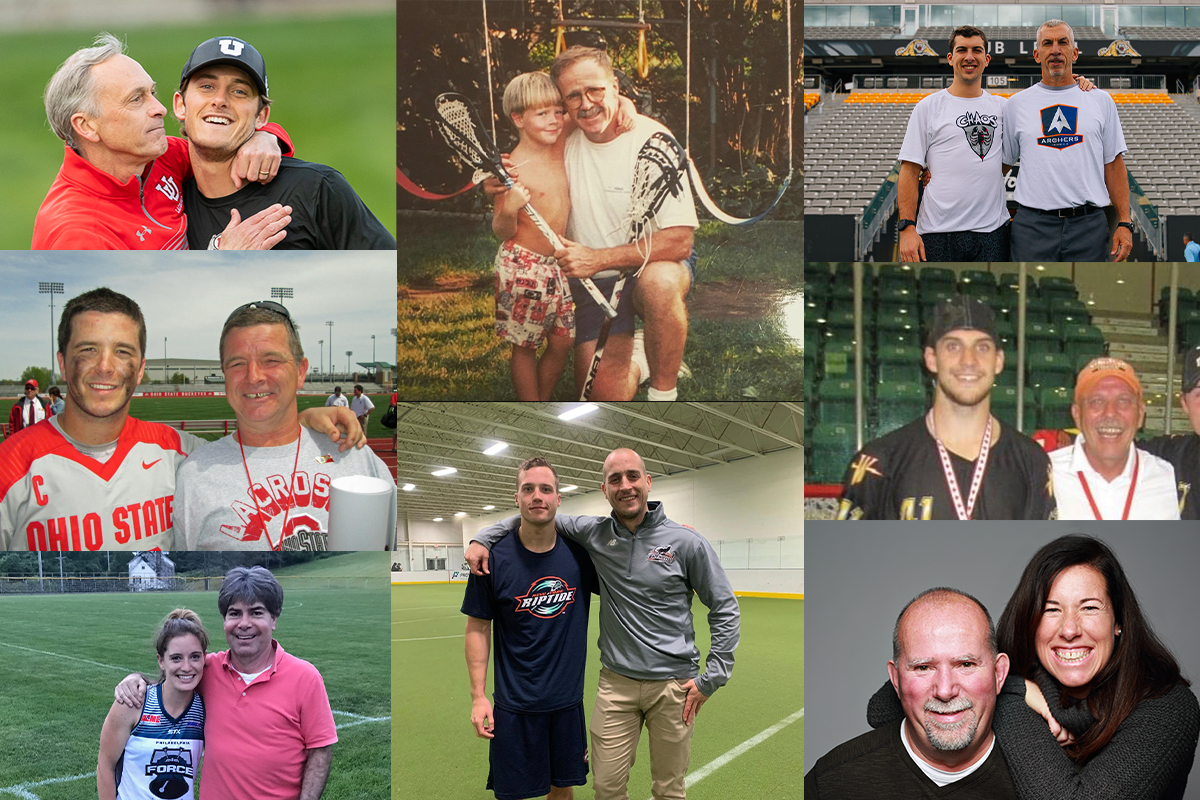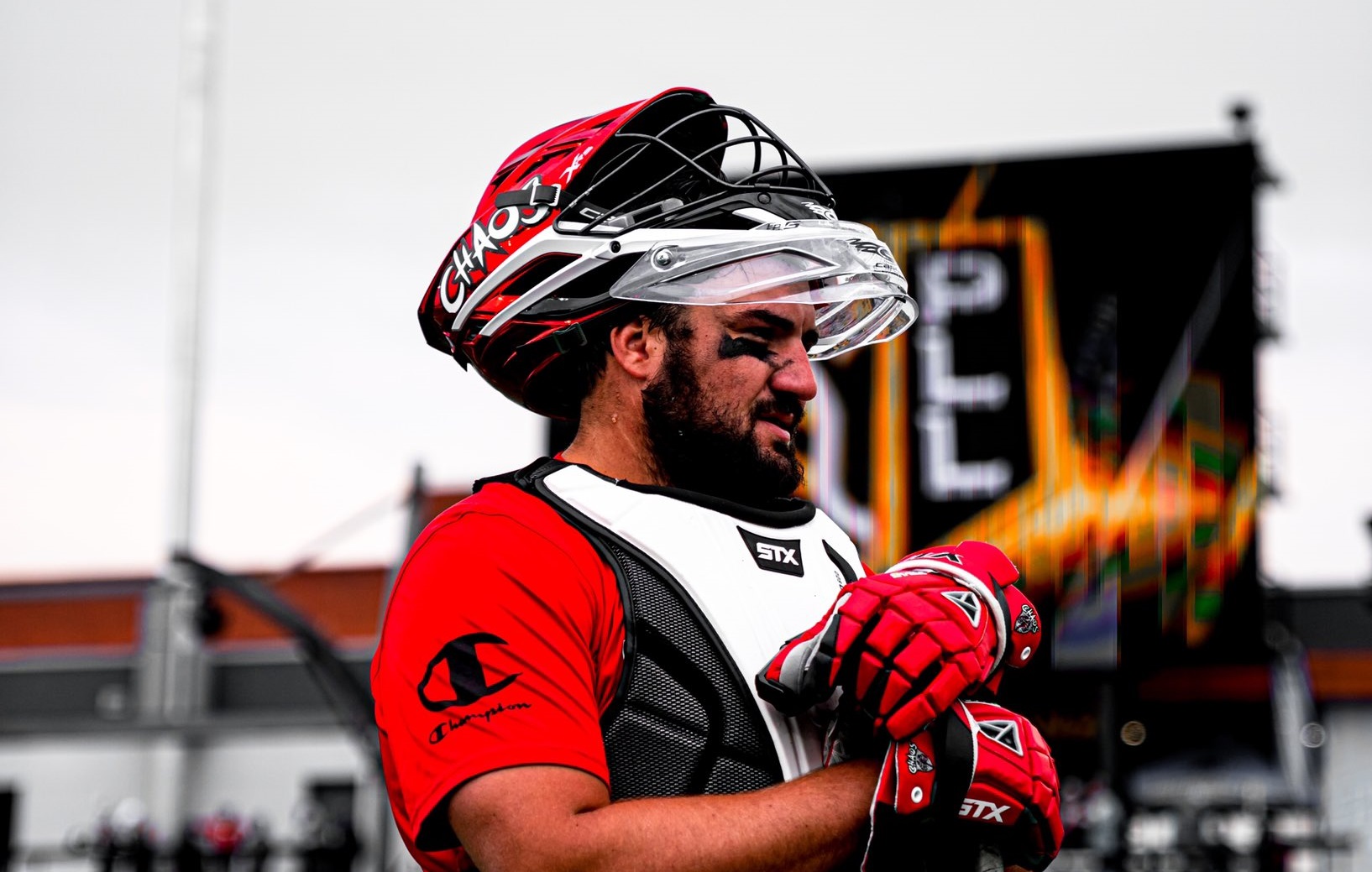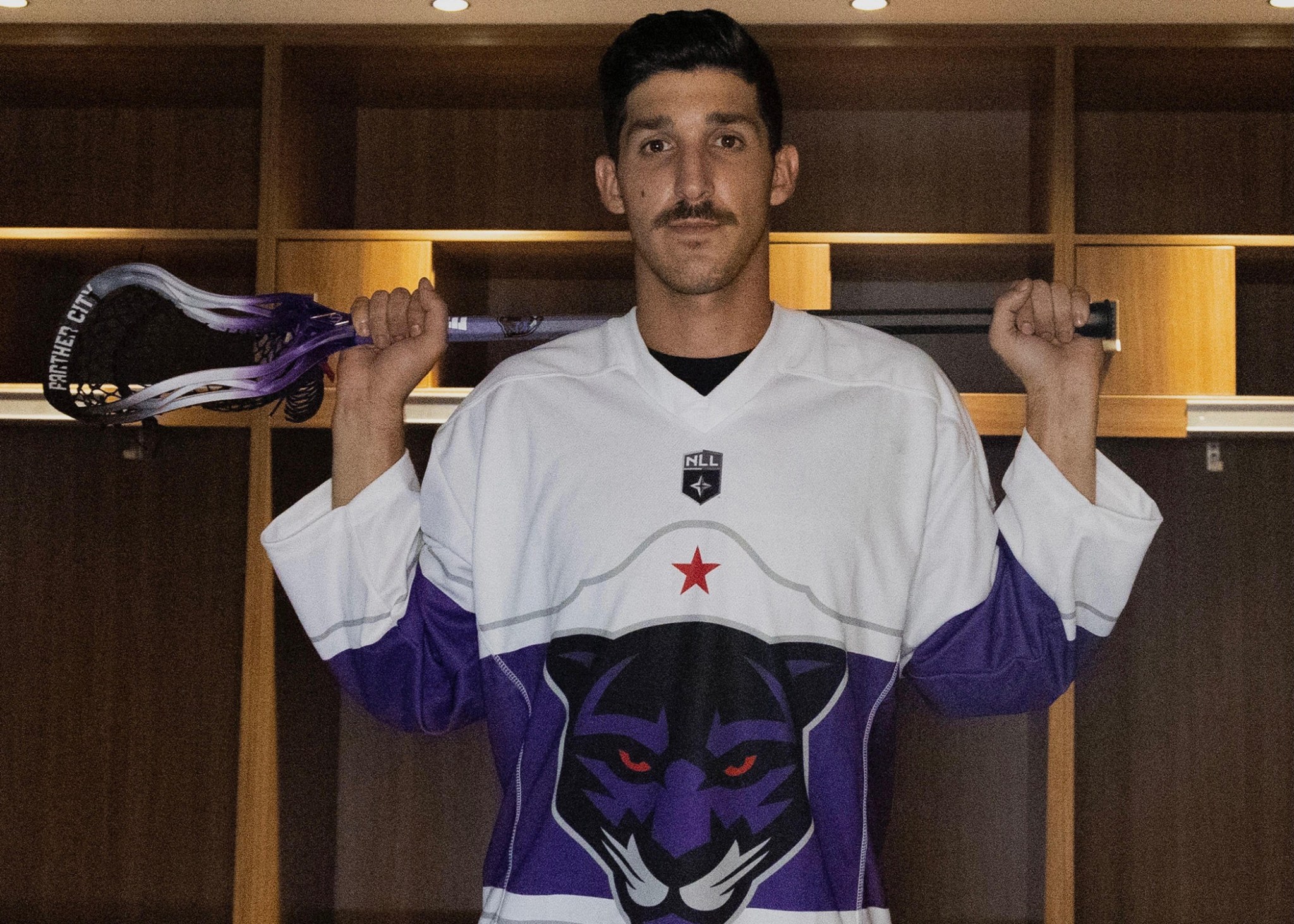There are many types of lacrosse dads. Some drive their sons or daughters to every practice and game while others rush to the field after work, just in time for the opening whistle. Some are pitching the tent and organizing food responsibilities at tournaments while others are just cheering on their kids from the sidelines. Some will play catch with their sons or daughters to make them better while others will motivate their kids to do wall ball instead.
Every type of lacrosse dad plays a role in shaping the athlete their child becomes, but those dads who have actually played or coached the sport before can put their sons or daughters at much bigger advantage. Many current professional lacrosse players have successful lacrosse dads who inspired them to play and continue to help them improve now.
Players from the MLL, NLL, PLL and WPLL share their stories about their dads and the connection they share with them.
Marcus Holman and Brian Holman

“Thank you for always being there and giving me the right advice when I need it. He is the main factor for me in pursuing a career in lacrosse. Without him, I would be a sale rep or something else right now that I wouldn’t be truly happy at. He has always been there, and he is my best friend.”
Lacrosse is a way of life in the Holman household, especially when growing up with a dad who was a three-time All-American goalie. Marcus and his siblings, Matt and Sydney, all began playing the sport at a young age and continued with it into college. Their dad Brian Holman always served as a great mentor without being forceful about the kids going out to practice in the backyard.
“He never made us do anything, like demanding we go outside to shoot and play catch,” Marcus said. “He would often say, ‘if you ever ask me to help or for advice, I’ll be there for you.’ He guided us to success and gave us freedom.”
This same sentiment didn’t necessarily carry over when Marcus’s dad became his club and rec coach. There came a point for Marcus where he had to tell his Dad that he couldn’t yell at him more than the other kids because it was messing with his head.
“That was a pretty special moment, and he took it to heart to be fair with criticism, which is tough on a lot of parents that coach their kids,” Marcus said. “That made our relationship stronger.”
Fast forward to Marcus’s career at North Carolina when his dad served as a volunteer assistant coach. The two didn’t interact much in practice because Marcus was an attackman and his dad focused on the goalies and the defense. Every once in a while, Marcus would pop into his dad’s office for a conversation to see what he could do to continue being successful.
All of this mentorship came to a head when UNC won the ACC Championship in 2013. It was Marcus’s senior year, and he was serving as a solo captain.
“I remember giving him a big hug after that game,” Marcus said. “It was rewarding for me, and I think it was great for him to see his son fulfill that.”
Now, Marcus coaches alongside his dad at Utah, building a culture together for a program that started just two years. It was a special moment for the duo when the Utes grabbed their win in program history over Mercer. His dad had sent a memo to the team the Sunday prior, explaining what he would say to them when they won their first game. Then, he said it almost word for word in the postgame meeting following the victory.
“My dad is a man of integrity and that was a great example of that, like if you say you are going to say something, say it,” Marcus said. “It has come full circle as I got to present him with the game ball after the win.”
Marcus continues to be in awe of his dad’s ability to make his players better people, and he continues to grow and learn better leadership and management skills from the mentor that has been there all along.
Dana Dobbie and Garry Dobbie
“Thank you for treating me as an individual and not necessarily as your little girl. Thank you for seeing the passion I had in sports and giving me opportunities to explore them. Thank you for kickstarting a journey in lacrosse I could have never imagined I would have now.”
Once Dana Dobbie was old enough to walk, she had a lacrosse stick in her hand. She would always play in the backyard with her dad and her brother, having the two of them challenge her while still keeping the practices lighthearted.
“When you look at my style, you can definitely see the two of them sprinkled in my game,” Dana said. “But my dad always teases me because he was fast and speedy, and that is certainly not my style of play. I always wonder where I lost that gene along the way.”
There weren’t many opportunities for girls to play lacrosse in Ferguson, Ontario, so her dad found a way to start a team and coach her just as he did for her brother. However, this required quite the balancing act as her dad also worked at a factory in their small town to provide for the family.
“He was constantly switching shifts to be able to coach our practices. I remember he worked four different types of shifts in one week, so he wouldn’t miss a single one,” Dana said. “He always put himself last to give my brother and I the best opportunities we could get.”
These opportunities he created for her allowed Dana to play at her dream school, the University of Maryland. She remembers calling him after the first practice to explain how much she was learning and what drills they had done that day. Her dad was excited she was achieving her goals, even if he couldn’t be around at the practices.
Both of her parents rarely missed her games, driving 11 hours in each direction to make it to College Park. Although they witnessed plenty of spectacular wins, Dana’s favorite memory is her senior day.
“Having my mom and dad out on the field, walking me out and experiencing this side of my lacrosse career, felt like an amazing way to honor what they gave up getting me to that point,” Dana said.
Dana is forever grateful for the continuous support from her dad, whether in college or in her professional career now. Her and her dad will still talk strategy before upcoming games because she completely trust his opinions after scouting teams for so many years. But apart from advice on her playing, Dana uses her dad’s coaching techniques as inspiration for her own as an assistant at Loyola University-Maryland.
“I always admired how he never had one specific way of doing things. He knew everyone needs to get coached differently with different learning styles. He also made practices fun and creative with no lines and game-like drills,” Dana said. “I have taken and reflected those specific things from his style to mine.”
Dana knows she wouldn’t have her work ethic and problem-solving abilities without the character she saw in her dad and that she will have her dad as a lacrosse mentor for the rest of her life, no matter what level she plays at.
Mark Cockerton and Stan Cockerton

“Thank you for all the tireless hours you put in driving me to practice and games and for giving up a large portion of your life for me. Thank you for introducing me to the sport I love. At the end of the day, I love you.”
Mark Cockerton grew up with a photo of his dad Stan Cockerton scoring the double-overtime game-winning goal in the 1978 World Lacrosse Championship in his basement. That was the first time Team Canada had beaten Team USA for the gold medal.
30 years later, Mark joined Team Canada for the 2018 World Lacrosse Championship in Israel. The gold medal match against Team USA was tied 7-7 with five minutes to play when Mark scored the go-ahead goal to give Canada the lead. Team USA would end up winning 9-8 on a controversial last-second goal, but in that moment when Mark scored, it felt like déjà vu.
“I was freaking out at the time because I would have had the game-winning goal just like him,” Mark said.
He always idolized his dad, especially when Mark was young, and his dad was the leading goal scorer in NCAA history. Mark dreamed of beating his record during his time at the University of Virginia, but he didn’t put up big enough numbers in the beginning of his career. He does cherish that he and his dad share the title for most goals in the NCAA as a father-son duo.
Mark’s dad was always there to support his career, even if it meant catching a flight from overseas to see him play. Mark remembers playing in the 2011 National Championship game against Maryland while his dad was serving as the President of International Lacrosse. His dad had missed the Final Four games but managed to make it in time to see Mark win the title as a freshman.
“It was my greatest moment and I’m glad I got to see him after the game,” Mark said. “We also made a bet that if we won, we could shave his moustache, which he has had since he was 16 years old. So before we went out to celebrate, we shaved it in our hotel room.”
Mark is still inspired by his dad’s dedication to growing the game, now serving as the President of the Ontario Lacrosse Association. Mark will continue teaching kids across North America in camps and clinics and hopes to broaden that to entire world, following in his dad’s footsteps.
Logan Schuss and Ed Schuss

“He is such a hard worker who would do whatever we needed for us to succeed, whether that is working late hours at work to afford new cleats or making a bounce back at the house for us to be better. His dedication to always wanting the best for us is something I will never be able to repay.”
From the moment he was born, Logan Schuss spent time at Ladner Arena, watching his dad play box lacrosse. His dad Ed Schuss was a scrappy defender who played with a wooden stick and was one of the last players to start wearing a face mask. He wasn’t afraid to get into fights, including one that Logan will never forget where his dad emerged from a scrap with blood coming down his face as the crowd chanted his name.
“He is as old school as it comes. He had a long mullet and a gold tooth, just that mean look,” Logan said. “Many players didn’t want to play against him because he was such a beast.”
Logan saw his dad’s work ethic in being meticulous and never taking a shortcut, and he applied it to his own game. He started playing lacrosse when he was three years old even though players were supposed to be five. His dad then coached him and his brother until high school, when he wanted his sons to learn from other coaches. Nevertheless, his dad would still take them to the box after games to helping them improve in whatever ways he could help.
“He was just as tough as a dad as he was as a player. He knew what we were capable of and always wanted us striving for greatness,” Logan said. “If we wanted to achieve at the levels we are at now, we needed some pressure and he held us accountable.”
When Logan went off to Ohio State, it was difficult for his family to attend games in person, so the family would hold watch parties at their house. His dad always had to sit in the same spot on the couch, so he could get the best view of the game to give proper feedback to Logan after the final whistle.
“He was always the first to tell us we played a great game and the great things we did, but the teaching also never stops,” Logan said. “That is a big reason why we still have conversations today.”
Even now, Logan’s dad continues to let him know what he needs to work when he drops him off at the airport for NLL games. Plus, his dad has never given up coaching as he continues to teach grass roots players in the B.C. area.
Patrick Resch and Tony Resch
“Thank you for always supporting me, first and foremost as a dad and second as a coach because there was never a time when lacrosse came first in our relationship. You have been an incredible inspiration for the man I want to be. I value that lacrosse connects us in our relationship, but it goes much deeper than that.”
Growing up, Patrick Resch aspired to be as good of a player as his dad. Tony Resch has won a gold medal with Team USA, won multiple MLL Championships as a coach, and he is currently in the NLL Hall of Fame after successful playing and coaching careers with the Philadelphia Wings. This was going to be no easy task, but luckily, Patrick got to learn from his dad as he served as his coach from rec through high school.
“There was some headbutting at times, but it was incredible to have him as a resource,” Patrick said. “It helped my development so much, knowing exactly what I had to improve upon.”
The car rides home after a loss or tough practice weren’t always easy, but the car rides to school were moments that Patrick cherished. His dad taught public speaking and served as the Athletic Director at La Salle College High School, so Patrick got to spend extra time with him by seeing him in the halls and on the rides to and from school.
“I loved sitting in the front seat of the car and talking to him about anything, not just lacrosse,” Patrick said. “Then we would walk across the faculty parking lot together. Those were some of our closest times.”
Lacrosse wise, Patrick and his dad found a lot of success in high school. They won the state championship his sophomore and junior year, and then exceeded expectations in his senior year by making it to the state championship after graduating a successful class at the start of the season. When Patrick walked off the field for the final time in high school, it represented the end of the era where his dad was coaching him.
Little did Patrick know that his Dad would get hired as an assistant coach for the Charlotte Hounds when he was playing on the team. According to Patrick, his dad was more subdued since the players didn’t need as much instructions, but he still got his yells in and he knew all the refs by name.
Patrick currently finds himself on opposite sidelines from his dad, playing in the PLL with Chaos LC, while his dad Tony coaches as an assistant with Archers LC. Now, Patrick no longer chases his dad’s legacy but rather focuses on his own personal achievements while still receiving advice and mentorship from his dad.
Emily Parros and Paul Garrity

“My Dad has always been my No. 1 supporter. I don’t even have the words or anything to give back to him as he really has given me everything. I am so thankful I get to be his daughter.”
There was one rule in the Garrity household when Emily Parros was in high school: When her team lost, no one could talk about lacrosse until dinner was over. Her mom Margie and dad Paul were her high school coaches, so dinner would last for hours talking strategy if lacrosse was brought up.
Both of her parents had played lacrosse in college with her dad attending Drexel University as a long pole defender and studying to be an accountant. Emily has seen how those two roles intertwine as he looks at lacrosse statistically.
“He is an extremely analytical person and I am very reactionary,” Emily said. “So he has taught me to take a step back, take in other perspectives, and learn outside of my abilities from a numbers standpoint.”
Her parents were dedicated to watching her grow in college, so they would drive over seven hours to UNC to watch her play. As coaches, they never missed a warm-up, and they stayed in Chapel Hill until the postgame meeting was over to talk to Emily, even though they were planning to drive back that night.
Emily will forever cherish winning the National Championship in her senior year for what it meant to her family. The championship was played at Villanova, not far from where she grew up, so her entire family came to see her compete. The game went into triple overtime, and North Carolina pulled off the win over top-seeded Maryland.
“I remember distinctly that they gave me the trophy, which was a bad call because I immediately ran to the sidelines and held the trophy above my head, looking at my dad with tears in my eyes,” Emily said. “They had poured their heart and soul into making me the athlete I am today, and this felt like an amazing way to give back.”
Emily values how her dad has kept her grounded as the game continues to grow and she has achieved more and more in her lacrosse career. She knows she is never bigger than the game and failure is the best way to grow because of the lessons she learned from her dad.
Tyson Gibson and Darryl Gibson
“Thank you for being there, for introducing me to the culture, and teaching me everything you knew. My love and passion for lacrosse is because of you, and the opportunities it gave me would not have presented themselves without your guidance. You are the biggest influence in my lacrosse career.”
A large part of Tyson Gibson’s childhood was watching his dad Darryl Gibson play in the NLL. His dad would constantly bring him into the locker room and down on the floor, exposing him the excitement and competition professional lacrosse could offer.
Reaching the NLL then became his goal from the moment he started playing lacrosse when he was three years old. His dad became his coach, working with him on ways to improve certain skills. As helpful as this was, it also came with its fair share of arguments between Tyson and his dad.
“Although we butted heads back then, those fights after practices and games are the reason I am here today,” Tyson said.
NLL draft night is a moment Tyson will remember forever as the New York Riptide selected him first overall. He will never forget watching his parents walk off the stage and celebrating with them in a rush of emotions.
Before his rookie season came to an unexpected halt because of coronavirus, Tyson and the Riptide faced the New England Black Wolves, the team his dad coaches for. It was a little weird for Tyson at first, but once the game got going, it was business as usual. And even though his dad coaches for an opposing team, it doesn’t stop Tyson from going to him for advice.
“He’s always been a coach in my life and most of what I have learned comes from him,” Tyson said. “I’m probably not going for any advice on how to score on the Black Wolves, but he’s always helping me improve.”
Tom Schreiber and Doug Schreiber

“I appreciate the opportunities you gave me to play at a high level and the sacrifices that were made along with that. You can do whatever you want with your life and you chose to prioritize us. I would have half the achievements I have in my life without these sacrifices, so that is something I truly appreciate.”
Tom Schreiber will always credit his dad Doug Schreiber as the reason he started playing lacrosse and the reason he began to excel at the sport from an early age.
“I had a lacrosse expert and a leadership and work ethic expert living in my house,” Tom said. “He coached me all through youth lacrosse, and he has been that constant advantage.”
Tom’s Dad introduced him to the concept of extra work, which has guided him to becoming the successful lacrosse player he is today. He would tell Tom that he must put in extra work after a team lift or practice to get ahead.
“It’s the time working on your own, whether stick skills, running, lifting,” Tom said, “If you commit that type of work ethic early on, you are going to make major strides forward.”
That extra work carried Tom to Princeton University, and his dad remained a loyal supporter and mentor. Tom recognized his dad’s quiet intensity in the stands, watching the game with a select few so that he could evaluate and analyze what was happening to talk with Tom after the game about what he could have done better.
“Even now, I’m getting that perspective whether or not I ask for it,” Tom laughed. “He is always a resource for me and has been there through my entire journey.”
One unique moment for Tom was playing for Team USA at the 2018 World Lacrosse Championship in Israel. It was certainly special to score the game-winning goal in the finals and win a gold medal, but it was even more important that his dad and his whole family was there to watch him. Doug Schreiber had played on Team USA in 1974, winning gold more than 30 years before his son did.
“It resonated after we won that we had both gotten to experience this feeling,” Tom said, “We didn’t have that many accolades to completely share, so that was an unforgettable moment.”
Tom is very appreciative of how selfless his dad has been in his life, pouring everything into being his coach and his dad. He values all the sacrifices his dad made, and Tom will forever claim he is an amazing dad first and the greatest coach he has ever learned from second.
Subscribe to and rate the Pro Lacrosse Talk podcast:









